Can Dogs Eat Apples?
This page contains affiliate links. We may earn money or products from the companies mentioned in this post through our independently chosen links, which earn us a commission. Learn More
An apple a day is supposed to keep the doctor away but will it keep the veterinarian away, too? Apples are a healthy snack for humans but what about your dog? Can dogs eat apples?
With a little caution, the answer is yes – dogs can eat apples, or at least some parts of the apple.
To find out how to safely give your dog some apple and avoid the dangerous parts, read our short guide about dogs eating apples.
Apple Nutrition Stats
There are over 7,500 kinds of apples in the world but they all have essentially the same nutritional content. One cup of apples (raw, with skin) (125 g) cut into quarters or chopped is considered a serving size for a human.
It contains the following:
- 65 calories
- 0.3 grams protein
- 0.2 grams fat
- 17.3 grams carbohydrates
- 3.0 grams dietary fiber
- Vitamin C 5.7 mg
One medium-sized apple contains about 95 calories.
Apples Nutritional Facts At A Glance
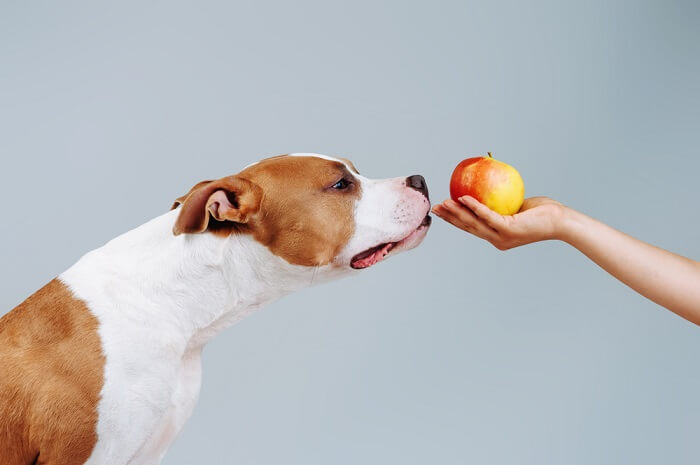
While apples have a reputation for keeping people healthy, that idea may be something of a myth. There are many fruits and vegetables with far more vitamins and minerals than apples. Compared to other fruits and vegetables, apples have a low content of micronutrients.
Like some other fruits, most of the calories in apples come from sugars.
On the plus side, apples are very low in saturated fat, cholesterol, and sodium. They are also a good source of dietary fiber and vitamin C.
The pectin in apple peels is a soluble fiber that is believed to help lower cholesterol and control blood sugar levels.-May-promote-gut-health.
Can Dogs Eat Apples?
Yes, dogs can eat the fleshy part of the apple and the skin but they shouldn’t eat the core or the apple seeds. The stem and the seeds of the apple contain amygdalin, a sugar and cyanide compound known as a cyanogenic glycoside.
Obviously, apple seeds are extremely small and your dog would have to eat a huge number of them before feeling any effects but it’s best not to give them.
The core of the apple can also be a choking hazard because of its size. Likewise, giving your dog an entire apple or even half an apple to eat could result in big pieces becoming lodged in your dog’s throat.
We suggest that you cut up small pieces of apple for your dog to eat and avoid giving your dog the core at all.
Are Apples Good for Dogs?
Apples are considered to be good for dogs. You will often find them added to dog foods today. Along with some of the health benefits already mentioned, apples can be a prebiotic to feed the healthy bacteria in your dog’s gut. It’s also thought that apple pectin may inhibit the growth of harmful bacteria in the digestive tract.-May-promote-gut-health such as Clostridium.
Apples have very little fat so they make a good treat for dogs that need to lose weight. They have negligible protein so they make a good snack for dogs on a low-protein diet.
Some people even claim that apples help keep the teeth clean and freshen a dog’s breath.
The color of the apple doesn’t make any difference to dogs as far as we could find. While some apples are sweet and some are tart and your dog may have his own preferences, they are all okay to give to your dog.
On the other hand, if you have a dog with cancer or diabetes, keep in mind that apples do contain sugars. They may not be appropriate for a dog with these health conditions. Speak to your veterinarian before giving your dog apples or other fruits.
How Much Apple Can (Should) Dogs Eat?
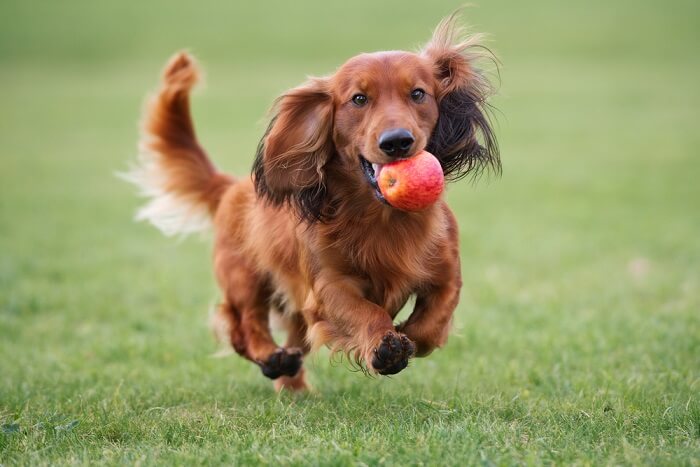
Too much of anything is not good and this is true with apples. Giving your dog too much apple can lead to diarrhea or stomach ache so only give your dog some apple in moderation. One or two slices of an apple is enough for one serving for your dog.
It’s always good to remember that treats should make up no more than 10 percent of your dog’s daily diet.
How Often Can Dogs Eat Apples?
You can give your dog slices of apple two or three times per week. Try rotating with other fruits and vegetables as treats so he can enjoy other flavors and textures.
The Correct Diet Is Important
Dogs need to eat the correct diet for good health. This means that they require good quality protein and fat. Foods like apples should only be given as an occasional treat.
While there are many different ideas about good dog foods and different ways to feed dogs, your dog needs the following in his diet:
- Good Sources of Protein- All dogs need good sources of protein in their diet. Meat, fish, poultry, and eggs are all good sources of animal protein.
- Good Sources of Fat- Fat provides essential fatty acids (EFA) and helps distribute the fat soluble vitamins A, D, E, and K so your dog’s body can absorb them.
- Named Ingredients- Look for named ingredients in your dog’s food and avoid generic ingredients. The more specific the ingredient is, the better. Otherwise, you can’t be sure what you are feeding your dog.
- Low to Moderate Carbohydrates- Many dog foods are loaded with carbohydrates. This is true even with some good quality dog foods. Carbohydrates are not “bad” and they can be beneficial (dietary fiber can come from carbs, for example). But carbs should not be a substitute for protein.
- Avoid Artificial Colors, Preservatives, and Sweeteners- Artificial preservatives and colors/dyes have been linked to some health problems in humans and animals. You should try to avoid these ingredients in dog foods.
- AAFCO- AAFCO is the Association of American Feed Control Officials. AAFCO sets voluntary standards for pet food labeling. Look for foods that follow these minimum standards.
- Fresh Water- All dogs need easy access to fresh water unless they are ill or have some other reason to be temporarily kept away from water. For example, you might keep water from a puppy overnight while you are house training him.
What Are Other Healthy Alternatives to Apples In A Dog’s Diet?

Apples are a healthy treat but there are many other fruits and vegetables that can provide some of the same benefits. You should consider these foods as treats. Give them to your dog occasionally and in moderation.
Check with your veterinarian if your dog has any health issues and you are concerned about giving any of these foods.
- Asparagus
- Bananas
- Bell pepper
- Broccoli
- Brussels sprouts
- Carrots
- Cauliflower
- Cucumber
- Green beans
- Mangos
- Oranges
- Parsnip
- Pears
- Pineapple
- Pumpkin
- Strawberries
- Summer squash
- Sweet potato
- Tomatoes
- Zucchini
How Do You Give Your Dog Apples?
Apples are a popular treat with some people who train dogs. You can dehydrate apple slices so they are dry and not messy when you put them in a pouch or bag. Or you can simply place small apple slices in a zip lock bag.
You can also add small apple pieces to your dog’s meal to make it more interesting.
Apples are featured in many dog cookie recipes. You can use apples or applesauce in recipes that call for pumpkin filling or other fruits. Apples go great with honey, cinnamon, and peanut butter and all of these ingredients are safe for your dog to eat. (Never use nutmeg in a recipe for your dog since it is toxic to them.)
It’s always fine to share a slice of apple with your dog when you are eating an apple yourself.
We don’t recommend giving your dog apple pie or some of the other baked goods made with apples just because they contain so much sugar.
Conclusion
Lots of dogs love apples just as much as people love them. Apples are a healthy snack for most dogs. If you’re thinking of giving your dog some apple, use moderation and avoid giving the core or seeds.
If your dog is diabetic or has other health issues, talk to your veterinarian before giving apples.

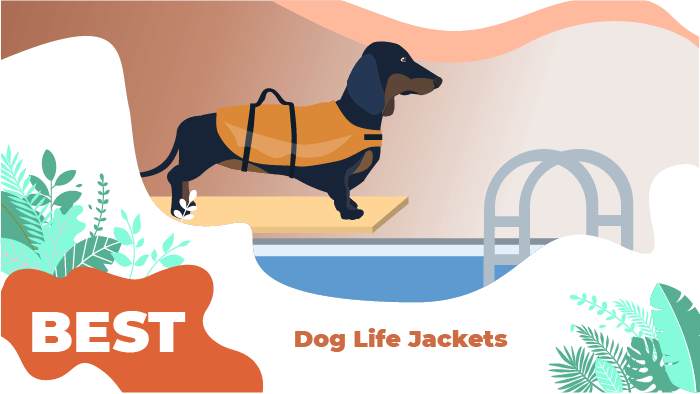
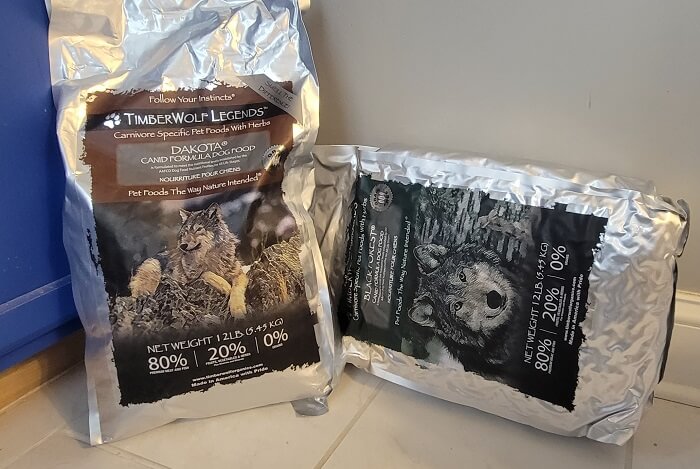
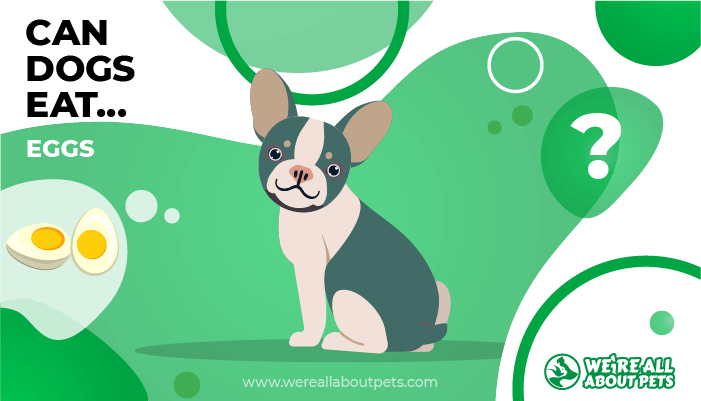
Noma Barton
Thanks for the tip about the Apple.
Carlotta Cooper
You're welcome. I hope your dog enjoys them!